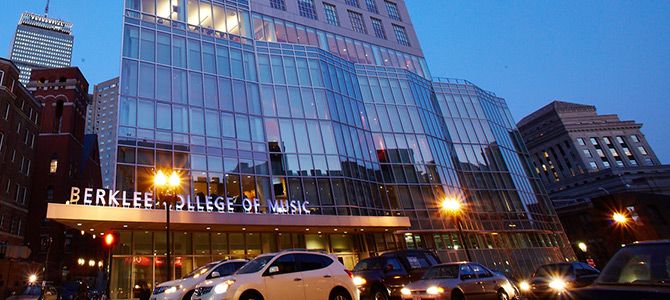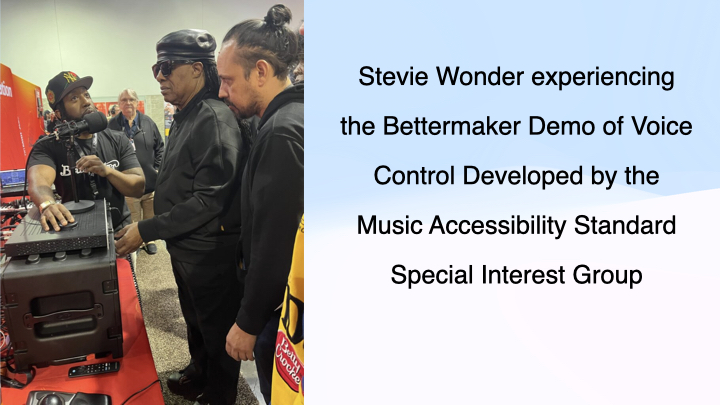Able Assembly At Berklee College Of Music

The MIDI Association and Music Accessibility
The MIDI Association has been exploring the possibilities of a Music Accessibility standard for several years now.
We started by working with Children’s Music Fund back in 2020.
Since then we have held numerous webinars and events about the possibilities of using MIDI to improve music accessibility.
https://midi.org/an-introduction-to-music-therapy-by-dr-deforia-lane
https://midi.org/the-healing-power-of-music-webinar-mimm-2021-week-1
https://midi.org/the-music-accessibility-standard-starts-to-take-shape
https://midi.org/fast-company-article-on-music-accessibility
https://midi.org/midi-association-presentations-on-the-music-china-2024-x-stage
https://midi.org/audio-developers-conference-2024-2
https://midi.org/meet-the-members-of-the-music-accessibility-standard-sig
https://midi.org/soundwithoutsight-com-offers-accessibility-resources-and-monthly-meetups
The Music Accessibility Special Interest Group (MASSIG) and how to join
The Music Accessibility Special Interest Group meets every Thursday at 8 am Pacific to discuss both the promotion of music accessibility and technical possibilities for using MIDI to improve accessibility.
It is easy to join the group by filling out this MIDI Initiatives form.
Sign up for the MIDI Association Initiatives
The MIDI Association MASSIG helped to sponsor the inclusive design workshop at ADC 2024.
The MIDI Innovation Awards and Accessibility
Several of the winners of the MIDI Innovation Awards in 2024 focused on accessibility.
Accessibility demos at NAMM 2025
At the last NAMM show, Haim Kairy from Arcana Strum and the folks from Bettermaker along with Sam Prouse developed a prototype of voice controlled software and hardware.

We are excited to be joining Music Accessibility Special Interest Group members Jay Pocknell from Soundwithoutsight and Tim Yates from Drake Music at the Berklee College of Music Able Assembly on April 11-13.
Details of the Able Assembly
Upcoming Events
The Berklee Institute for Accessible Arts Education (BIAAE) is delighted to announce the 2025 ABLE Assembly: Arts Better the Lives of Everyone conference, which will take place April 11–13, 2025. In-person and online attendance options are available.
Registration is now open.
The conference registration fee is $125 and includes:
If You Attend In Person:
- Sessions at Berklee College of Music in Boston
- An opening reception on April 11
- Lunch on April 12 and April 13
- Access to recorded sessions and supporting materials after the event has concluded
- Admission to the Berklee Institute for Accessible Arts Education’s (BIAAE) Digital Learning Series, 12 monthly webinars and workshops with hands-on teaching strategies that will be offered from May 2025 through April 2026; and
- The opportunity to earn 18 professional development points(Opens in a new window).
If You Attend Online:
- Livestream access to keynotes and some workshop sessions
- Access to exclusive curated pre-recorded sessions and supporting materials by luminaries in the field
- Day-ending synthesis discussions with opportunities to engage with the presenters
- Admission to the Berklee Institute for Accessible Arts Education’s (BIAAE) Digital Learning Series, 12 monthly webinars and workshops with hands-on teaching strategies that will be offered from May 2025 through April 2026; and
- The opportunity to earn 18 professional development points(Opens in a new window).
Schedule
Full schedules and session information are posted. You can access it with the drop-down menu.
Accessibility
Synchronous sessions will be live-captioned and American sign language–interpreted. Asynchronous sessions will be captioned.
Presentations by MASSIG Members at the Able Assembly
There are many great presentations at the Able Assembly, but we are really looking forward to these two by members of the MIDI Association Special Interest Group.
Adaptive Instruments: Progress, Challenges and Solutions
An Introduction to AMIC and Trans-Atlantic Instrument Development
Presented by: Sally Currie, Tim Yates, John Kelly, David Cardona, Adrian Anantawan, Chi Kim
We know that world it can be incredibly difficult, if not impossible, for anyone who needs an accessible musical instrument or accessible music tech to find something that works for them. Even if something exists it can be prohibitively expensive or hard to get hold of. We aim to address this problem by building AMIC, the Accessible Musical Instrument Collection, a national collection of accessible instruments and music technology with full online catalogue including, where available, source-code and design files for instruments. We will present this project at this workshop, outlining the issues we intend to address, how we intend to do it and where we are on the path to realising the project. There is a separate document attached with more details around AMIC and the impact we hope it might have. We would also like to propose the inclusion of a trans-Atlantic instrument development project to act as a case study of how such a resource might work. This follows the exploration in late 2024 of the exchange of design files for instruments developed in the US and the UK which will be independently and remotely built, exchanging knowledge and expertise in the process. We would then come together at the workshop for a demonstration of the instruments and an overview of the successes and challenges of the process – ideally with stac and students of BIAAE presenting the results of this co-production project alongside their UK peers.
We think this would be a compelling example of how such resources and collaborations, if more widely available, could make a difference in the availability of accessible instruments world-wide.
Accessible Music Notation: Where Are We Now?
Presented by: Jay Pocknell
Recent global collaborations in technology, standards, and good practice, led by the DAISY Consortium and supported by RNIB, have unquestionably reversed the decline in accessible music production and use.
Musicians with print disabilities can now be increasingly confident of having scores in their required formats, which has historically presented a huge barrier to equitable access.
Strategic interventions mean that in 2025:
•Print-disabled musicians can independently create and explore scores in mainstream music notation software;
•Publishers better understand accessible music formats, and music-setters can engrave scores which are ‘born accessible’ by following best practice guidance;
•The standard music file format, MusicXML, has been upgraded to include information needed for accessibility;
•MusicXML can be easily and reliably converted into braille music and Modified Stave Notation using free tools.
We now need to ensure the sector is aware these developments. We encourage you all to become accessible music champions!